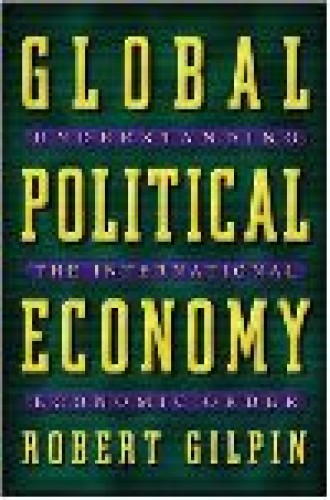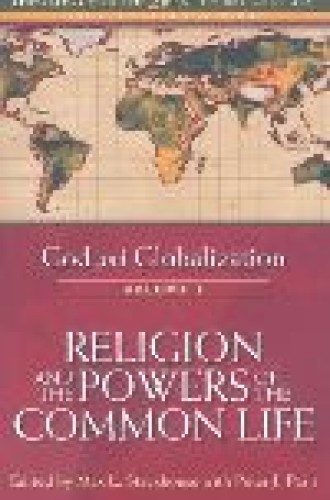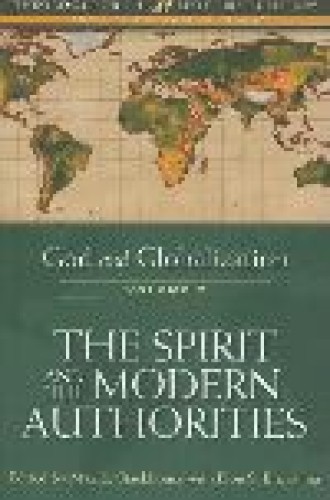Thinking globally
As the automobile has been the vehicle and symbol of American mobility, the airplane has been the vehicle and symbol of global mobility. If a person can afford the airfare, he or she can fly from one world capital to any other in even less time than it takes to drive from New York to Los Angeles.
On September 11, terrorists turned that symbol into a weapon against globalization itself. Although Americans continue to see the catastrophic events as an attack on the U.S.—and, of course, it was—as many as a fourth of the victims were citizens of other countries. They hailed from over 80 countries, and most worked together peaceably and efficiently in the center of world trade. And, according to a chaplain at “ground zero,” the victims’ families communicate their grief in over 150 languages.
Yet the recent terrorism was not only an attack on globalization; it was also an expression of it. That is, the cells of the al-Qaeda network depend on the same international technological, economic and travel infrastructure that has fueled globalization’s more positive features. The devastating events and their aftermath highlight this reality: globalization has many faces, many dimensions. Some are good. Others are bad. And what’s good for some people may well be bad for others.
Given the multipronged nature of the phenomenon, it should be no surprise that books on globalization often sound more like a Tower of Babel than a coherent conversation. Is globalization chiefly about the economy? Trade? Technology? Telecommunications and the Internet? Human rights? Culture? A new consciousness of being a world citizen?
Depending on whom you ask, the agents of globalization vary widely: multinational corporations like General Motors, Nike and Coca-Cola (the largest employer in sub-Saharan Africa); the United Nations and the thousands of nongovernmental organizations; the World Bank, the International Monetary Fund and the World Trade Organization; or CNN and Disney. Some commentators have also cited international crime networks. Now we must include al-Qaeda.
For most social scientists, the debate over the meaning of globalization focuses on whether it is centrally and fundamentally an economic process. This predominant view sees advances in computing, telecommunications and travel largely in terms of economic transformation. It regards globalization as the liberalization of markets that enable free trade. An accompanying, often-unquestioned assumption is that democratic reforms go hand in hand with “marketization.” Other social scientists have resisted the exclusive focus on the economic process as well as the overly benign interpretation of its effects.
Robert Gilpin’s ambitious and thorough treatise fits within this debate. Gilpin, emeritus professor of politics and international affairs at Princeton University, acknowledges that his own sympathies lie with free trade, but he differs with those who would explain the world in wholly economic terms.
Global Political Economy acknowledges the potential of multinationals to influence political as well as economic life. According to Forbes magazine, the largest multinational corporations, such as General Motors, Ford and Mitsubishi, enjoy total sales that exceed the gross domestic product of all but the most productive nations in the world. Other economic dimensions, notably the staggering levels of global finance (e.g., foreign currency exchange totaling $1.5 trillion per day), dwarf even global trade of products.
Combining political and economic analysis, Gilpin’s own “state-centric” realism is a welcome expansion of narrower economic interpretations. He argues that the state, like the market, remains a principal institution. He also cautions against overestimating the power of multinational corporations; most economic transactions still occur within nations and not across nations.
Gilpin poses a fundamental question: “Is the purpose of economic activity to benefit individual consumers, to promote certain social welfare goals, or to maximize national power?” He rejects the standard economic view (benefit individual consumers) by emphasizing the political goal of maximizing national power.
Gilpin pays less direct attention to the “social welfare goals” of nations or the world. For instance, problems of inequality and poverty are almost invisible in the text. He mentions briefly the recent “antiglobalization” protesters, but he does not take them seriously. Since he takes a realist position in analyzing how powerful institutions compete, negotiate and cooperate, people with neither political nor economic access are not actors in his account. While his analysis is not nearly as narrow or dogmatic as those of unbridled proponents of the free market, he is open to the same criticism: he leaves it to fate—or at least to the market and the state—to resolve problems like poverty.
Given that his topic is global political economy, it is perhaps less noteworthy that Gilpin also neglects religion and religious institutions in his text. His own position of seeing the economy as “embedded” in sociopolitical contexts and social values opens the door for dialogue about the cultural-religious ethos and ethical, even explicitly theological, assessment of global processes. That is a principal aim of the God and Globalization volumes, edited by Max Stackhouse and colleagues.
In volume I of God and Globalization, Roland Robertson criticizes the market-centered (“economistic”) view of globalization, and contends that even broader views of political economy miss the role of religion. Gilpin, for instance, asserts that the term “globalization” became popular in the late 1980s in reference to multinational firms and foreign investment. Robertson, however, emphasizes that the concept caught the attention of scholars of religion in the 1970s. He and many other authors in God and Globalization also note that the ecumenical and interfaith movements constitute a religious dimension of globalization.
Indeed, one of the most significant contributions of the volumes by Stackhouse et al. is the inquiry into how religion in various forms is—and should be—an actor in globalization. Stackhouse, an ethicist at Princeton Theological Seminary, posits that theological ethics should help us to understand and assess the ethos surrounding globalization and then help us to shape it. A faith-based evaluation of globalization will lead us to affirm some of its aspects but will require us to reject others.
Essays by William Schweiker and Donald Shriver specify to Christians, congregations and wider institutions their call to take a critical, prophetic stance toward the economic and political powers of our global age. Schweiker and Shriver introduce frameworks, each based on the respect due to all people as created in the image of God, to judge global realities in terms of Christian ethics.
Shriver’s words are sadly fitting and challenging. He asks, “Can children of God use violence to kill some and to protect other children of God?” He confesses that during World War II, Americans grieved little over the killing of German or Japanese civilians by Allied firebombs and nuclear detonations. In the post–September 11 world, it remains hard for U.S. Christians to reflect upon or weep about the killing of Afghan civilians. We fear undermining a would-be united front against terrorism. Is it possible for U.S. Christians to evaluate their own (and their society’s) nationalism from a constructive and critical perspective of faith? At a minimum, Shriver calls us to such reflection before either joining or resisting the contemporary war effort. More substantively, his arguments would call Christians to find ways to be peacemakers even—especially—at this troubled moment.
Yersu Kim catalogues the humanitarian dimension of globalization, and John Witte, in volume 2, shows the interrelationships between the global human rights discourse and Christian theology. Beginning with the Universal Declaration of Human Rights in 1948, the postwar period has hosted world conferences on every conceivable problem and issue, ranging from the rights of children, women and refugees to the preservation of the environment. Kim seeks to foster interfaith coalitions for global humanitarianism, while Witte argues that Christian conceptions of the human being influenced the language of secular human rights discourse. Kim and Witte would agree, from different viewpoints, that the international discussion needs the resources and insights of religious traditions. They also argue that religious traditions should incorporate human rights in their communal life and witness.
This humanitarian face of globalization has a different set of advocates (and opponents) than economic globalization has, and the subject leads to a different conversation than Gilpin’s analysis of globalization’s economic and political aspects. The challenge for the readers of these books—and for anyone trying to understand globalization—is to see the interrelationships between the various realities and perspectives.
Like it or not, economists have come to dominate the public discussion, and even broadminded public critics have taken on the debate in their terms. Stackhouse and colleagues help widen the conversation by focusing on the religious dimensions of globalization. They also provide analyses of the many sectors and spheres of society that are affected by global changes.
At the same time, some of the lack of connection has to do with the immense variety of the topics addressed in the multiple volumes of God and Globalization. (Volumes III and IV are forthcoming.) Despite Stackhouse’s creativity, the structure of the first three volumes along the lines of “principalities,” “authorities” and “dominions” is somewhat arbitrary. For instance, the section of volume II on “authorities” (or authorities and regencies) contains chapters on education, law, medicine, technology, nature and exemplary moral leaders. In distinctive ways, each essay demonstrates how a topic is influenced by, and in turn affects, global changes. Yet the authors’ topics are not analogous, and their approaches are not parallel. I do not envy the task of making some order out of the diverse questions surrounding God, Christian faith and globalization. But it may be best not to insist on a neat structure to such a complex set of problems.
Many of these authors emphasize that globalization is not necessarily a phenomenon to be celebrated. We need less convincing of that than we did prior to September 11. But in addition to terrorism and military conflict, Americans still need to confront the growing reality—and awareness—that the global economy remains highly unequal, including over 2.8 billion people who survive on less than two U.S. dollars per day.
Income inequality in the world as a whole is greater than the inequality in any particular nation. If people were to understand themselves as part of a world economy and a global income distribution, they would realize that the global village has more disparity than even countries like South Africa or Brazil. We need hardly remind ourselves of the social disorder and violence that prevails in these unequal nations.
Whether or not the economic dimension of globalization is helping to lessen or increase inequality (and it depends on whom you ask), the consciousness-raising dimension of globalization is surely making people more aware of the disparities. Will citizens and leaders address that potentially explosive problem, or will they build higher walls to keep rich and poor apart? From the standpoint of Christian ethics, the “separate and unequal” solution is morally unacceptable. Schweiker, Witte and other authors help build that case. How to address global inequality more directly is one of globalization’s most pressing challenges.
In the end, the faces of globalization that matter are not technology, economics, politics or rapid social changes. They are the 6 billion people who are affected by those factors. Globalization should neither be welcomed uncritically nor dismissed as wholly deleterious. We need better conceptions of global justice and criteria for evaluating social changes. On this point the essays by philosophically and theologically informed scholars can guide us. Social scientists like Gilpin are invaluable conversation partners. A principal ethical criterion must be the effects of globalization on the people who do not currently have the economic or political power to be part of our conversation. Those many faces of globalization are also created in the image of God.







